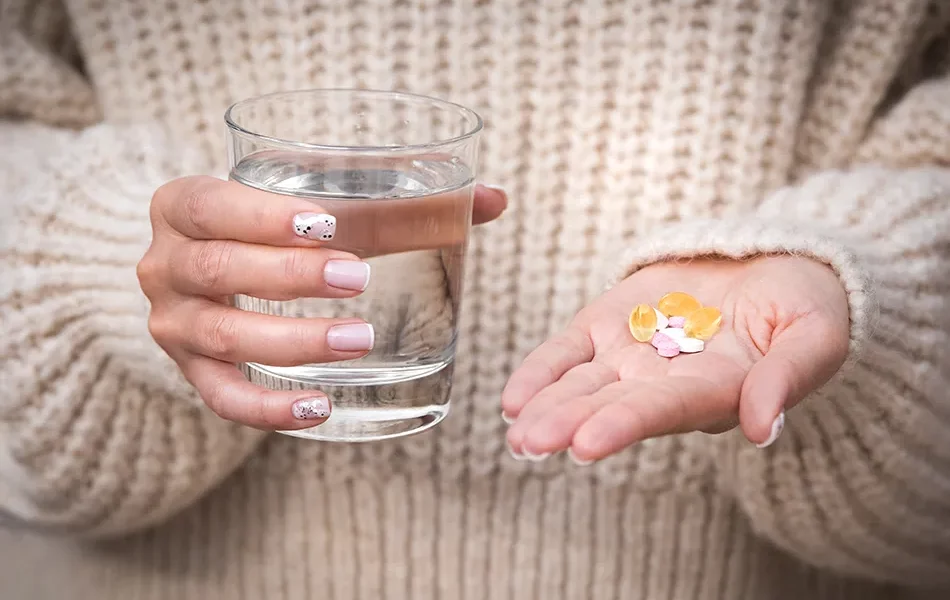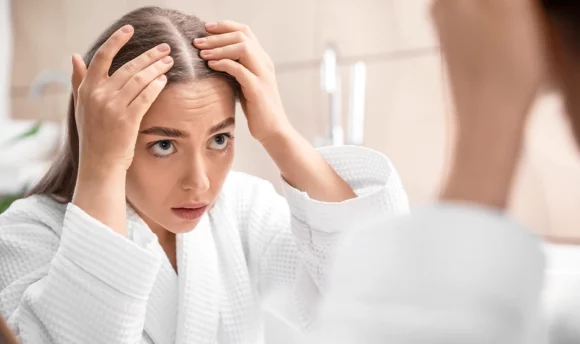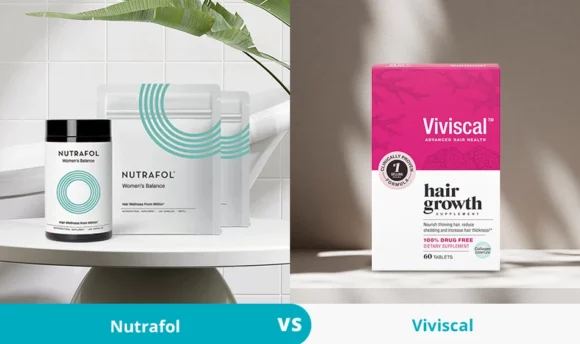Vitamin B12 for Hair Growth: What You Need to Know
Want to grow thicker, longer hair? Explore the importance of vitamin B12 and how it helps to maintain healthy hair.

It is often assumed that you need to invest in expensive haircare products to grow luscious, long locks. However, this is not always the case.
Without having the right amount of vitamins and minerals in the body, you are likely to have dry, brittle hair that may struggle to grow. Vitamin B12 is one of the key nutrients that your body needs for healthy hair growth.
Discover how vitamin B12 impacts the health of your hair and how to ensure that you are consuming the right amount for your needs.
Vitamin B12 for Hair Growth: Does It Impact Hair Health?
The level of vitamin B12 in your body does impact the health of your hair. This is because it helps to form red blood cells, which carry oxygen around the body to wherever it is needed.
This oxygen enables essential nutrients to reach the scalp. Tiny blood vessels carry these nutrients to the hair shaft, the visible part of your hair, allowing you to grow healthy new strands.
Vitamin B12 is essential for maintaining regular red blood cell levels throughout the body, which means the scalp is never malnourished. This creates healthy conditions for hair growth.
If you have a vitamin B12 deficiency, only small amounts of oxygen will reach the hair follicles. This means that you will be unable to sustain healthy hair growth.
Although vitamin B12 is essential for promoting long and luscious locks, it works as part of the complex family of B vitamins to maintain hair health.
For example, vitamin B7, also known as biotin, contributes to the production of keratin. Keratin is an amino acid that forms healthy hair tissue. Studies have shown that 38% of women suffering from hair loss have a biotin deficiency.
A deficiency in any of the B vitamins can, therefore, affect the function of B12 and the rest of the group. Consuming a balanced diet rich in foods with all 8 B vitamins will help you achieve optimal hair growth.
What Is Vitamin B12?
Also known as cobalamin, vitamin B12 is a water-soluble vitamin that is essential for maintaining a healthy metabolism.
As one of the 8 B vitamins, B12 also helps your central nervous system to function correctly and enables the body to convert food into energy. This ensures that you do not become too weak or tired to function.
The vitamin is responsible for producing red blood cells, which transport oxygen and essential nutrients where they are needed in the body, including to the hair. It also ensures that the cells are the correct size and shape to carry the oxygen.
Failing to have enough vitamin B12 can cause you to feel tired and sluggish. Vitamin B12 deficiency also prevents your scalp from receiving the nutrients it needs to grow healthy hair.
How to Use Vitamin B12 for Hair
You can ensure that your body has sufficient levels of vitamin B12 by eating a healthy, well-balanced diet.
Animal products, such as poultry, beef, and seafood, are some of the most abundant sources of vitamin B12 that can be purchased in grocery stores.
You can also get vitamin B12 from dairy products, such as milk, yogurt, and paneer. Eggs, shiitake mushrooms, and fortified breakfast cereals are great sources of vitamin B12, too. You should try to include some of these foods in your diet each day.
As those on a vegetarian, plant-based, or vegan diet do not consume animal products, they are at greater risk of vitamin B12 deficiency.
To prevent this, they should take a vitamin B12 supplement. Supplements typically come in capsule form and can be used without medical supervision.
Those who have severe vitamin B12 deficiency may be advised to use an injectable form of the vitamin. This requires a prescription from your doctor.
Can Vitamin B12 Deficiency Cause Hair Loss?
Vitamin B12 helps form skin and hair cells. A deficiency of this vitamin, therefore, reduces cell formation, which means fewer new hair strands can be produced.
Because it helps make and regulate red blood cells, a lack of vitamin B12 in your diet causes once-healthy hair follicles to be deprived of oxygen. This is because your body sends oxygen to vital organs to keep them functioning, not to hair follicles.
The follicles become weak and brittle, making hair thinning more likely.
How Much Vitamin B12 to Take per Day for Hair Growth
The recommended amount of vitamin B12 for an average person over 14 years old is 2.4 micrograms per day. Most people are able to get this amount through their diet and do not need to take a supplement.
The ideal dosage will depend on factors such as sex, age, and your reason for taking the supplement. For instance, older adults may need to take higher amounts of vitamin B12 to achieve optimal levels in the body.
A study found that 90% of older adults who supplemented their diets with 500 micrograms of vitamin B12 for 8 weeks had normal levels of it. However, some people may require up to 1,000 micrograms.
Up to 20% of those over the age of 60 have low levels of the nutrient in their blood. This is because as you age, your body makes less intrinsic factor, a type of protein that helps your intestines absorb vitamin B12 properly.
Also, those who are pregnant or breastfeeding will need to consume between 2.6–2.8 micrograms per day. This can be met through diet or by taking prenatal vitamins.
A higher amount is required during pregnancy because vitamin B12 deficiency has been linked with lower birth weight for newborns, as well as premature birth.
4 Benefits of Vitamin B12 for Hair
Now that you understand what vitamin B12 is and how it impacts hair health, you may be interested to learn the benefits of the vitamin.
Here’s how keeping an optimal level of vitamin B12 within your body may help to nourish, strengthen, and restore the color of your hair:
#1 Thickens hair
One of the key roles of vitamin B12 is to ensure that iron is absorbed properly into the body.
As an essential mineral, iron is crucial for hair growth as it helps to maintain healthy follicles. Iron deficiency can also cause severe hair loss, as it slows down the formation of red blood cells.
Getting enough vitamin B12, therefore, ensures proper iron absorption, helping new strands to grow with strength and thickness.
As vitamin B12 increases the transportation of oxygen to each hair follicle, it also helps hair to appear thicker. This is because it generates the replacement of lost strands.
#2 Reduces gray hair
The development of gray hair is inevitable for most people as they age. This happens as the body has fewer melanocyte cells.
These cells are responsible for producing melanin, the pigment that colors hair. Air pockets instead replace melanin in the hair shaft, which leaves hair gray.
Those who are deficient in vitamin B12 may experience premature graying. This is because the body is unable to create enough new red blood cells to carry oxygen and essential nutrients to the hair follicles.
As a result, the body has an imbalance of melanocytes, causing less melanin to be produced.
However, your hair may be turning gray due to other factors, such as zinc, iron, or folic acid deficiency, stress, smoking, or genetics. In any of these cases, supplementing vitamin B12 is unlikely to help.
#3 Might reduce hair loss
Being deficient in vitamin B12 can increase the rate of hair loss. This is because the vitamin plays an important role in creating new red blood cells.
These cells help transport oxygen to hair follicles, meaning they get the nutrients that they need to grow new hair. This also replaces hair that may fall out naturally.
A study found that those who supplemented their diets with vitamin B12, biotin, L-lysine, and iron had a significant reduction in hair shedding.
However, although hair loss is a symptom of vitamin B12 deficiency, there is no evidence to suggest that the vitamin prevents hair thinning from happening in the first place. Consuming more vitamin B12 is, therefore, unlikely to reduce hair loss.
Also, hair loss may be caused by several other factors, such as stress, genetics, hormonal imbalance, or the use of excessive heat. If you are losing hair due to any of these issues, then consuming more vitamin B12 is unlikely to solve the problem.
#4 Strengthens hair
As we know, having enough vitamin B12 in your body helps with the formation of red blood cells. These cells carry oxygen to the follicles in the scalp.
It also helps to keep red blood cells healthy, making sure that they are the right size and shape for optimal oxygen transportation.
This ensures that they get all of the vital nutrients they need to metabolize the amino acids within the scalp and build strong hair strands.
FAQs
Vitamin B12 is good for your hair as it can support hair health, may reduce hair loss, and helps hair to appear thicker and stronger.
Those who are deficient in vitamin B12 may suffer from hair loss and premature graying.
If you take B12 supplements or eat more foods rich in the vitamin, you should see hair regrowth within 6 months to 1 year.
However, this will depend on how severe your vitamin B12 deficiency was to begin with.
Yes, having enough vitamin B12 in your body can help thicken your hair. This is because it forms red blood cells that carry oxygen to the scalp and replace lost hemoglobin. As a result, your hair will appear thicker.
The vitamin also helps iron to be absorbed in the body, which is another mineral responsible for red blood cell formation.
A Word From an MD
If you are experiencing excessive hair loss or are having trouble regrowing your hair, you may have a vitamin B12 deficiency. However, there could be a variety of reasons why you are losing hair.
You should see your doctor to rule out more serious causes or to have a blood test for deficiency.
For example, you may have pernicious anemia, an autoimmune condition that means your body is unable to absorb vitamin B12. You will need regular vitamin B12 injections to treat this condition.
Get vitamin B12 into your diet by eating more milk, cheese, eggs, salmon, haddock, and yogurt.
Those who are pregnant may need a higher amount of vitamin B12 for healthy hair and overall wellness. Consult your doctor or midwife if you are unsure of how much you should consume during pregnancy.
Conclusion
B12 is an essential vitamin for promoting strong, healthy hair growth. Be sure to include a variety of vitamin B12 sources in your diet to prevent deficiency. The vitamin is found primarily in meat and dairy products.
If you have trouble getting the average recommended daily intake of 2.4 micrograms in your diet, you may benefit from taking a vitamin B12 supplement.
In addition to vitamin B12 deficiency, there are many factors that contribute to hair loss, such as environmental pollution, genetics, and hormonal imbalances. You should identify the root cause to find a treatment that works for you.

















































 Select your language:
Select your language: 








